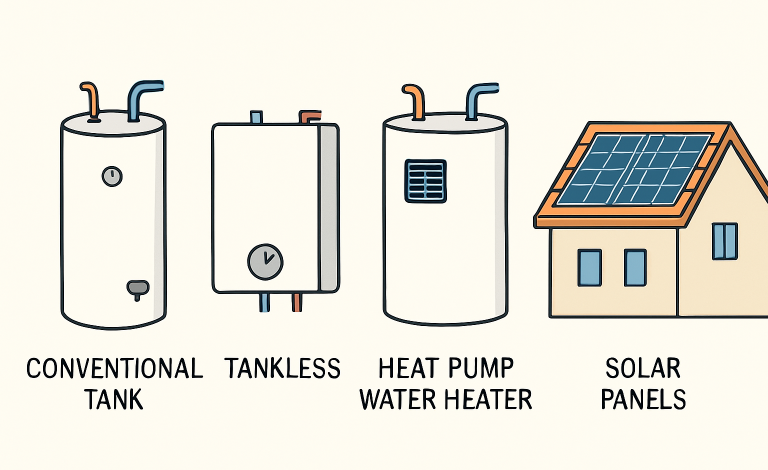How to Choose and Maintain an Efficient Water Heater

Key Takeaways
- Understanding the different types of water heaters allows for a more informed purchase.
- Your choice of size, energy source, and model greatly impacts efficiency and savings.
- Routine maintenance ensures optimal function and prolongs the lifespan of your water heater.
Ensuring your home has a reliable, energy-efficient water heater is critical for comfort, reducing energy bills, and lowering your environmental footprint. Homeowners often face challenges when selecting the right water heater for their needs, from fuel types to installation and long-term maintenance. When it’s time to install or upgrade, it’s smart to consult specialists such as Tankless water heater installation in Ruston local specialists, who can help you select options suited to your household’s demands and guide you through proper setup.
With new technologies and strict energy standards, today’s water heaters can dramatically reduce your utility costs while enhancing daily convenience. This guide explores water heater types, what to consider before buying, best practices for ongoing maintenance, and how to make the most of rebates or incentives available in your area.
Types of Water Heaters
When evaluating water heater options, it’s essential to know the benefits and drawbacks of each type so you can match your household’s water usage patterns and energy priorities:
- Conventional Storage Water Heaters:These are the most common, featuring a large tank that stores preheated water. While they deliver a steady supply, they can occasionally run out during heavy use and waste energy maintaining temperatures when hot water isn’t needed.
- Tankless (On-Demand) Water Heaters: These models heat water only as it flows through the system, delivering it instantly and reducing standby energy loss. Modern units are compact, highly efficient, and ideal for households seeking space savings and lower utility bills.
- Heat Pump Water Heaters: By absorbing warmth from the air or ground, these units use far less electricity than traditional electric models. They’re especially well-suited for warm climates or homes with dedicated installation space.
- Solar Water Heaters: These harness solar energy via rooftop panels to heat water, offering significant environmental advantages and, over time, the lowest running costs—although they require higher upfront investment and adequate sun exposure.
Factors to Consider When Choosing a Water Heater
Choosing the right water heater involves more than just picking the latest model. You need to evaluate the following:
- Fuel Type: Your options include electricity, natural gas, propane, or even solar energy. Local utility costs and fuel availability should guide your decision, as operating expenses can vary dramatically between types.
- Capacity and Size: An undersized heater won’t meet your household’s needs, leading to cold showers and stress on the unit, while an oversized system wastes energy. Calculate your daily hot water demand and consult sizing charts—like those from the U.S. Department of Energy—to ensure a precise fit.
- Energy Efficiency: Look for models with high Energy Factor (EF) or Uniform Energy Factor (UEF) ratings, which indicate better performance and lower running costs. ENERGY STAR-labeled appliances are generally among the most efficient.
- Total Cost: Factor in both the purchase price and estimated annual operating costs. Higher-efficiency units often cost more up front but pay off in savings within a few years.
Maintenance Tips for Optimal Performance
Proper maintenance safeguards your investment and ensures you get the most from your water heater. Here’s how to keep your system in peak condition:
- Lower the Temperature Setting: Set your thermostat to 120°F—hot enough for daily needs but cool enough to avoid scalding and save substantial energy.
- Insulate Tank and Pipes: An insulation blanket for your tank and foam sleeves on pipes cut heat loss and minimize the amount of energy required to keep water hot.
- Flush Sediment: Drain a few quarts from your tank annually (or as the manufacturer’s guidelines recommend) to prevent mineral buildup, which impairs efficiency and shortens the heater’s lifespan.
- Inspect the Anode Rod: This crucial component attracts corrosive minerals. Replace it if more than 50% is worn out to prevent premature tank failure.
- Address Leaks Quickly: Small drips from fittings, valves, or tank seams can cause significant water and energy waste—not to mention property damage—if left unchecked.
Get detailed step-by-step instructions for these and additional tips from The Home Depot’s maintenance guide.
Read also: Tiles and Deco: Redefining Home Interiors One Tile at a Time
Energy-Efficient Water Heater Options
Modern water heaters are designed for maximum efficiency and longevity. When it’s time to upgrade, consider these standout options:
- Heat Pump Water Heaters: These units use electricity to move heat instead of generating it, making them three times more efficient than conventional electric models. Households can save hundreds yearly on energy bills with these units.
- Tankless Water Heaters: By only heating water when you need it, these systems cut energy use by roughly 24–34% for homes using 41 gallons or less of hot water daily.
- Solar Water Heaters: While the initial installation can be significant, the long-term energy and monetary savings are notable, and the environmental benefit is unmatched.
Review the pros and cons of each efficiency-focused type on the Consumer Reports water heater buying guide.
Financial Incentives and Rebates
Switching to an energy-efficient water heater doesn’t just cut your monthly bills—it can also mean upfront savings thanks to incentive programs. Many utilities and government agencies offer generous rebates, low-interest financing, or tax credits for qualified upgrades. For example, homeowners in some areas can receive credits topping a thousand dollars for installing approved models. Incentive amounts and eligibility vary by location, so check with your local energy provider or city administration for current offers.
Conclusion
Selecting and caring for your water heater doesn’t have to be complicated. Understand the types available, match your needs with the right size and efficiency, keep up with basic maintenance, and you’ll enjoy reliable hot water and lower expenses for years to come. Whenever you’re ready to upgrade, seek guidance from qualified professionals and take full advantage of rebates or energy credits to maximize your investment.




